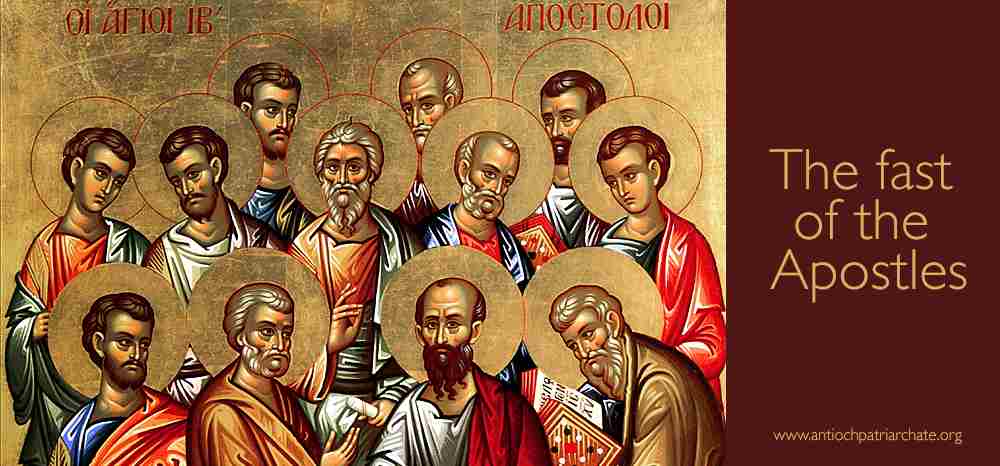The Fast of the Apostles

We read in the Gospel of St. Mark: "The disciples of John and of the Pharisees were fasting. Then they came and said to Him, ‘Why do the disciples of John and of the Pharisees fast, but Your disciples do not fast?’ And Jesus said to them, ‘Can the friends of the bridegroom fast while the bridegroom is with them? As long as they have the bridegroom with them they cannot fast. But the days will come when the bridegroom will be taken away from them, and then they will fast in those days’” (Mark 2:18-20).
Therefore, the early church, after the ascension of Christ to heaven and the descent of the Holy Spirit, joined her preaching with fasting and prayers. The church believes that fasting is a powerful weapon that supports her ministry, delivers her from the snares of the devil, and keeps the spirit of asceticism of the church and the feeling of being sojourners in this world. So we, as Orthodox Christians, wait eagerly for the fast of the apostles after the long holy fifty days without fasting to be recharged again with spiritual strength through metanoias "prostrations" and abstaining from food.
The fast of the apostles is practiced till now in most of the traditional churches, however its length varies from one to another. It always ends with the commemoration of the martyrdom of the two great apostles, Sts. Peter and Paul, which is on Abib 5th according to the Coptic calendar.
It is important to note that before the year 1582 AD, Abib 5th corresponded to June 29th, but, after adjusting the Julian calendar to the Gregorian calendar, Abib 5th came to correspond to July 12th. This means that the apostles fast increased by 13 days in the Coptic church, will increase by an additional day after the year 2100 AD, and will continue to increase thereafter. But if we succeed in adjusting the Coptic calendar, the apostles fast would return to the length it was before 1582 AD, and the Apostles feast on Abib 5th would correspond to June 29th and remain on that date, without adding any additional days to the fast, going forward.
The church chants many beautiful specific hymns during the fast of the apostles, like "Assomane," "Ontos," and "Niromi," as well as the hymn "Enthoten thaa ~N0wten de" which is one the most beautiful hymns of the Coptic Orthodox Church.
https://www.youtube.com/watch?v=xDPahzYVOl0
Its lyrics are three verses that came from the mouth of the Lord Jesus Christ, to Whom be the glory, when He talked with His disciples after the Last Supper, and which St. Luke recorded in his Gospel. The Lord Jesus appreciates His disciples, who labor in the service and bear suffering with Him, and He promises them great glory in His kingdom. He said: "But you are those who have continued with Me in My trials. And I bestow upon you a kingdom, just as My Father bestowed one upon Me, that you may eat and drink at My table in My kingdom, and sit on thrones judging the twelve tribes of Israel" (Luke 22:18-20). These golden words are carried on in an amazing tune that lasts about 15 minutes. It starts with deep, quiet melodies, and, as the hymn progresses, the tunes become very joyful and fly to heaven many times. When I hear it, I always wish it would not come to an end.
Generally, the fast of the apostles is a joyful period in the Coptic liturgical year, in which the church, inspired by the spirit of the holy apostles, is renewed in her pastoral and missionary work, taking them as role models, beseeching God through fasting and prayer to remember the salvation of the whole world, to bless His people, to keep them away from all evil, growing in His love, being filled with the knowledge of His will, and fruitful in every good deed for the glory of His holy name. Amen.